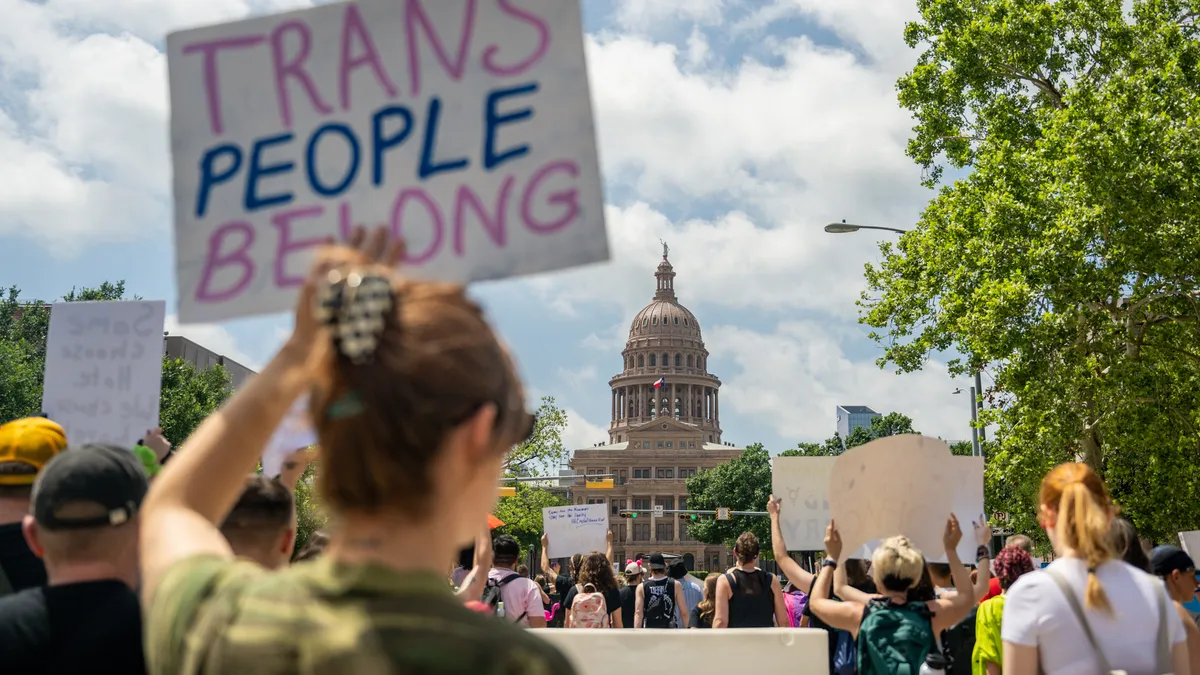Dive Brief:
- Two-thirds (65%) of LGBTQ+ individuals are concerned about how anti-LGBTQ+ legislation will affect their employment, and 77% say they’d hesitate about applying for a position in a state with anti-LGBTQ+ laws, the results of a recent Indeed survey revealed.
- The findings, released May 30, also provide insight into what draws LGBTQ+ talent to a job in the wake of hostile legislation. Nearly 6 in 10 of more than 700 LGBTQ+ respondents told Indeed they believe their employer should have benefits specific to LGBTQ+ individuals, although only 23% say their employer does. In job postings, LGBTQ+ job seekers said they look to see if a potential employer offers LGBTQ+-specific benefits, such as healthcare services with access to LGBTQ+-friendly providers, LGBTQ+ diversity training and benefits extended to employees’ domestic partners.
- Trans-specific benefits also are uncommon, the results shows. “In times such as these when growing anti-LGBTQ+ legislation may give way to even greater uncertainty and segregation, it’s important for LGBTQ+ workers to prioritize jobs offered by companies that actively work to shape their workplace environments in diverse and inclusive ways,” Indeed said.
Dive Insight:
As of June, the ACLU is tracking 491 anti-LGBTQ+ bills — a substantial increase over recent years, Indeed noted.
The effect on LGBTQ+ employees and job seekers is well-documented. About 45% of LGBTQ+ employees who responded to a recent Glassdoor survey said being out in the workplace could hurt their careers. One in 5 LGBTQ+ respondents who are not out at work said in a Society for Human Resource Management survey they believe they would not be promoted if they shared their identity at work.
In addition, 30% of the LGBTQ+ employees participating in the Indeed survey relayed that while working for a former employer, they experienced discrimination. Results showed this behavior is compounded for transgender individuals, Indeed said.
Despite these numbers — and amid growing polarization over the issue — 80% of Americans said they favor laws that protect LGBTQ people against discrimination in jobs, public accommodations and housing, according to a 2022 survey by the Public Religion Research Institute. This includes 48% who strongly support such laws, the PRRI said.
And although some recently incited attacks against retailers like Target for their annual LGBTQ+ Pride displays and ad campaigns, “a clear majority of Americans who don’t identify as LGBTQ+ believe companies should publicly support the [LGBTQ+] community,” CNBC reported June 1. CNBC cited a February survey by GLAAD finding that 70% of non-LGBTQ+ adults agree companies should publicly support LGBTQ+ people through hiring practices, advertising and/or sponsorships.
HR professionals can make a strong business case for diverse and inclusive work environments, a strategy particularly important for corporate CEOs perceived as harboring a lack of empathy for employee mental health: In a May poll, 34% of workers told Monster they identify as LGBTQ or Queer — more than one-third of a much-needed talent pool for many businesses.
Also, in a 2022 Deloitte survey, 70% of LGBTQ+ employees said they’re inclined to stick with their current employer because of its LGBTQ+ inclusion approach, such as establishing employee resource groups and visible company allyship. Almost all (95%) said these initiatives create “meaningful support for LGBTQ+ employees.”
HR pros involved in talent acquisition may want to note Indeed’s advice to LGBTQ+ job seekers. The platform said applicants can determine whether a potential employer is actually committed to D&I by being aware of certain cues. It advised prospective employees to check, for example, whether company employees include their pronouns in email signatures and whether the interview process includes company leaders that suggest a wide range of ages, ethnicities and genders.













